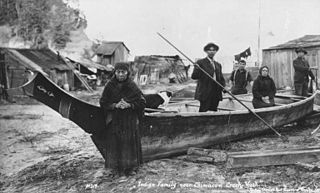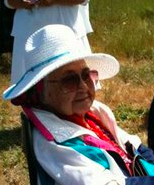Related Research Articles

Sequim is a city in Clallam County, Washington, United States. It is located along the Dungeness River near the base of the Olympic Mountains. The 2020 census counted a population of 8,018, with an estimated population in 2022 of 8,319.

Theodore Huebner Roethke was an American poet. He is regarded as one of the most accomplished and influential poets of his generation, having won the Pulitzer Prize for Poetry in 1954 for his book The Waking, and the annual National Book Award for Poetry on two occasions: in 1959 for Words for the Wind, and posthumously in 1965 for The Far Field. His work was characterized by a willingness to engage deeply with a multifaceted introspection, and his style was overtly rhythmic, with a skilful use of natural imagery. Indeed, Roethke's mastery of both free verse and fixed forms was complemented by an intense lyrical quality that drew "from the natural world in all its mystery and fierce beauty."

The Klallam are a Coast Salish people Indigenous to the northern Olympic Peninsula. The language of the Klallam is the Klallam language, a language closely related to the North Straits Salish languages. The Klallam are today citizens of four recognized bands: Three federally-recognized tribes in the United States and one band government in Canada. Two Klallam tribes, the Jamestown S'Klallam and Lower Elwha Klallam, live on the Olympic Peninsula, and one, the Port Gamble S'Klallam, on the Kitsap Peninsula in Washington state. In Canada, the Scia'new First Nation is based at Becher Bay on southern Vancouver Island in British Columbia.
The Jamestown S'Klallam Tribe is a federally recognized tribe of S'Klallam or Klallam Native Americans. They are on the northern Olympic Peninsula of Washington state in the northwestern United States.
Tess Gallagher is an American poet, essayist, and short story writer. Among her many honors were a fellowship from the Guggenheim Foundation, National Endowment for the Arts award, Maxine Cushing Gray Foundation Award.
Gladys Cardiff is an Eastern Band Cherokee poet and academic, with interests in Native American, African-American and American literature. She was an associate professor at Oakland University from 1999 to 2013.

The Chimakum, also spelled Chemakum and Chimacum Native American people, were a group of Native Americans who lived in the northeastern portion of the Olympic Peninsula in Washington state, between Hood Canal and Discovery Bay until their virtual extinction in 1902. Their primary settlements were on Port Townsend Bay, on the Quimper Peninsula, and Port Ludlow Bay to the south.

Edward M. Hirsch is an American poet and critic who wrote a national bestseller about reading poetry. He has published nine books of poems, including The Living Fire: New and Selected Poems (2010), which brings together thirty-five years of work, and Gabriel: A Poem (2014), a book-length elegy for his son that The New Yorker called "a masterpiece of sorrow." He has also published five prose books about poetry. He is president of the John Simon Guggenheim Memorial Foundation in New York City.

Klallam,Clallam, Ns'Klallam or S'klallam, is a Straits Salishan language historically spoken by the Klallam people at Becher Bay on Vancouver Island in British Columbia and across the Strait of Juan de Fuca on the north coast of the Olympic Peninsula in Washington. The last native speaker of Klallam as a first language died in 2014, but there is a growing group of speakers of Klallam as a second language.
Nationality words link to articles with information on the nation's poetry or literature.
Pattiann Rogers is an American poet, and a recipient of the Lannan Literary Award for Poetry. In 2018, she was awarded a special John Burroughs Medal for Lifetime Achievement in Nature Poetry.

Carolyn Ashley Kizer was an American poet of the Pacific Northwest whose works reflect her feminism. She won the Pulitzer Prize in 1985.
Nationality words link to articles with information on the nation's poetry or literature.

Lenard Duane Moore in Jacksonville, North Carolina. He is a writer of more than 20 forms of poetry, drama, essays, and literary criticism, and has been writing and publishing haiku for more than 20 years.
James L. White was an American poet, editor and teacher.
David Russell Wagoner was an American poet, novelist, and educator.
Tiffany Midge is a Native American poet, editor, and author, who is a Hunkpapa Lakota enrolled member of the Standing Rock Sioux.
Roberta Hill Whiteman is an Oneida Nation poet from Wisconsin. She is known for the collections Star Quilt (1984) and Philadelphia Flowers (1996). She received the 1991 Wisconsin Idea Foundation's Excellence Award.

Hazel M. Sampson was an American Klallam elder and language preservationist. Sampson was the last native speaker of the Klallam language, as well as the oldest member of the Klallam communities at the time of her death in 2014. She was a member of the Jamestown S'Klallam Tribe of Washington.
"Root Cellar" is a poem written by the American poet Theodore Roethke (1908-1963) published in Roethke's second collection, The Lost Son and Other Poems, in 1948 in Garden City, New York. The poem belongs among Roethke's series of "Greenhouse Poems" the first section of The Lost Son, a sequence hailed as "one of the permanent achievements of modern poetry" and marked as the point of Roethke's metamorphosis from a minor poet into one of "the first importance", into the poet James Dickey would regard among the greatest of any in American history.
References
- 1 2 3 4 5 "Duane Niatum". Poetry Foundation. Retrieved 2020-10-10.
- ↑ Senier, Siobhan (2019). "Duane Niatum: A Retrospective". Transmotion. 5 (1): 234–240. doi:10.22024/UniKent/03/tm.797 . Retrieved 2020-10-11.
- 1 2 3 "The Art of Survival", Raven Chronicles, David L. Moore Archived December 31, 2008, at the Wayback Machine
- ↑ "Earth Vowels by Duane Niatum". Mongrel Empire Press. Retrieved 2020-10-11.